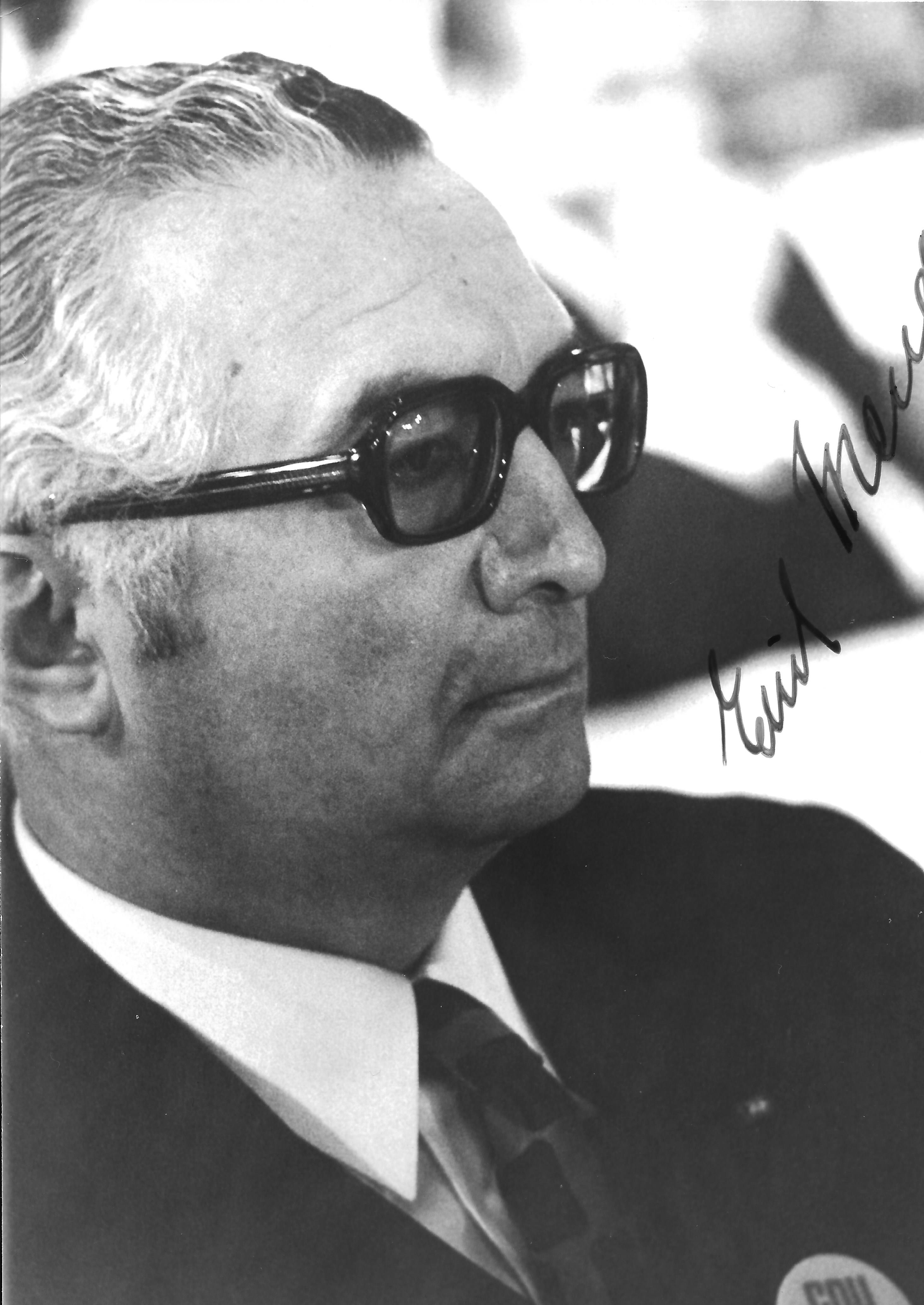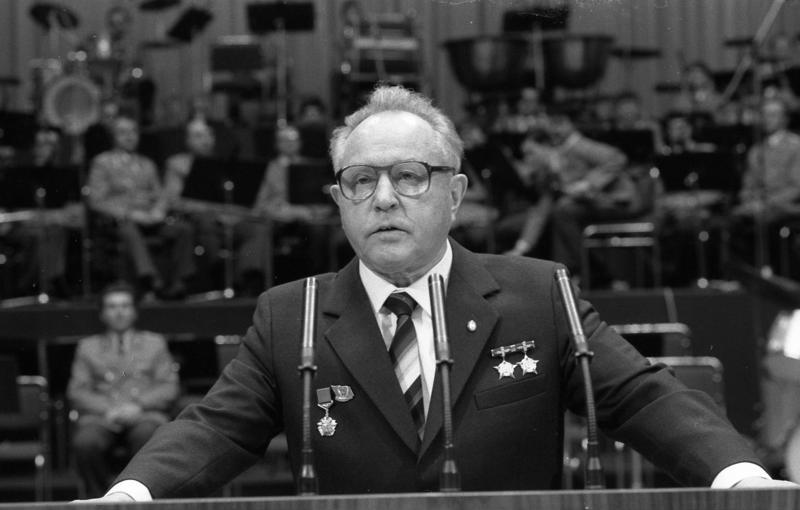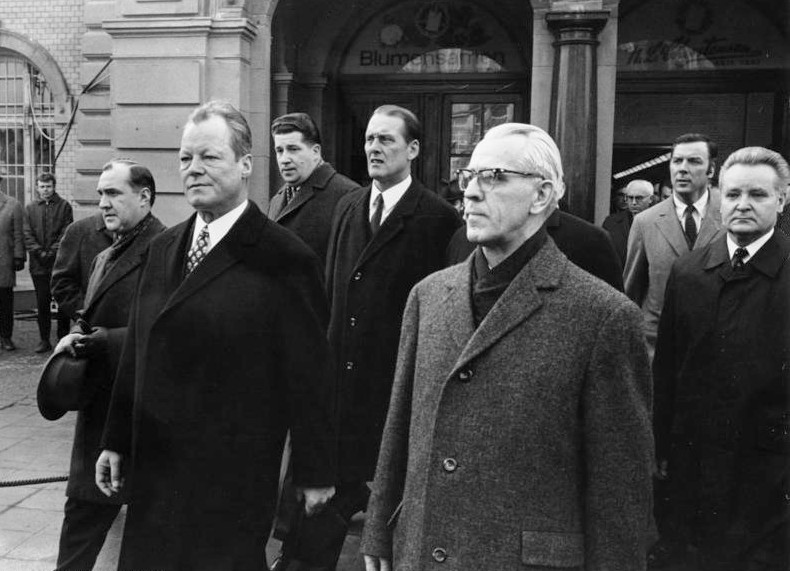|
West German Federal Election, 1972
Federal elections were held in West Germany on 19 November 1972 to elect the members of the 7th Bundestag. In the first snap elections since the resumption of democratic elections in 1949, the Social Democratic Party became the largest party in parliament for the first time since 1930, winning 230 of the 496 seats. The coalition with the Free Democratic Party was resumed. Campaign The Social-liberal coalition of SPD and FDP had lost its majority after several Bundestag MPs (like former FDP ministers Erich Mende and Heinz Starke or SPD partisan Herbert Hupka) had left their party and become members of the CDU/ CSU opposition to protest against Chancellor Willy Brandt's ''Neue Ostpolitik'', especially against the ''de facto'' recognition of the Oder-Neisse line by the 1970 Treaty of Warsaw. On 27 April 1972 the opposition had tried to have CDU leader Rainer Barzel elected new chancellor in a motion of no confidence, but Barzel surprisingly missed the majority in the Bund ... [...More Info...] [...Related Items...] OR: [Wikipedia] [Google] [Baidu] |
Bundestag
The Bundestag (, "Federal Diet") is the German federal parliament. It is the only federal representative body that is directly elected by the German people. It is comparable to the United States House of Representatives or the House of Commons of the United Kingdom. The Bundestag was established by Title III of the Basic Law for the Federal Republic of Germany (, ) in 1949 as one of the legislative bodies of Germany and thus it is the historical successor to the earlier Reichstag. The members of the Bundestag are representatives of the German people as a whole, are not bound by any orders or instructions and are only accountable to their electorate. The minimum legal number of members of the Bundestag (german: link=no, Mitglieder des Bundestages) is 598; however, due to the system of overhang and leveling seats the current 20th Bundestag has a total of 736 members, making it the largest Bundestag to date and the largest freely elected national parliamentary chamber in the w ... [...More Info...] [...Related Items...] OR: [Wikipedia] [Google] [Baidu] |
Erich Mende
Erich Mende (28 October 1916 – 6 May 1998) was a German politician of the Free Democratic Party (FDP) and Christian Democratic Union (CDU). He was the leader of FDP from 1960 to 1968 and the vice-chancellor of West Germany from 1963 to 1966. Early life Mende was born on 28 October 1916 in Groß Strehlitz, in the Province of Silesia, a province in the Kingdom of Prussia. Today it is Strzelce Opolskie, part of Opole Voivodeship in Poland. He was the third of four children of Max Mende (1885–1943) and his wife Anna (1889–1968), née Krawietz, of Polish descent. He had a seven-year-older brother Walter and a five-year-older sister Amalie. His father was the director of a secondary school ('' Volksschule'') and, as was usual among Catholics, a supporter of the Centre Party. He grew up in region of Silesia heavily fought over during the Silesian Uprisings of 1919 to 1921 that culminated in the Battle of Annaberg (21–26 May 1921). He also experienced the Upper Silesia occ ... [...More Info...] [...Related Items...] OR: [Wikipedia] [Google] [Baidu] |
1972 Summer Olympics
The 1972 Summer Olympics (), officially known as the Games of the XX Olympiad () and commonly known as Munich 1972 (german: München 1972), was an international multi-sport event held in Munich, West Germany, from 26 August to 11 September 1972. The event was overshadowed by the Munich massacre in the second week, in which eleven Israeli athletes and coaches and a West German police officer at Olympic village were killed by Palestinian Black September members. The motivation for the attack was the ongoing Palestinian-Israeli conflict. The 1972 Summer Olympics were the second Summer Olympics to be held in Germany, after the 1936 Games in Berlin, which had taken place under the Nazi regime, and the most recent Olympics to be held in the country. The West German Government had been eager to have the Munich Olympics present a democratic and optimistic Germany to the world, as shown by the Games' official motto, ''"Die Heiteren Spiele"'', or "the cheerful Games". The logo of th ... [...More Info...] [...Related Items...] OR: [Wikipedia] [Google] [Baidu] |
Hauptverwaltung Aufklärung
The Main Directorate for Reconnaissance (german: ; german: , ) was the foreign intelligence service of the Ministry of State Security (''Stasi''), the main security agency of the German Democratic Republic (East Germany), from 1955 to 1990. The HVA was an integral part of the Stasi, responsible for operations outside of East Germany such as espionage, active measures, foreign intelligence gathering, and counterintelligence against NATO-aligned countries and their intelligence agencies. The Stasi was disbanded in January 1990 and the HVA's mode of operation was revealed to the public, including its internal structure, methods, and employees. The HVA became the subject of broad interest and intensive research under the responsibilities of the Federal Commissioner for the Stasi Records. The HVA is regarded by some as the most effective foreign intelligence service during the Cold War and the second largest after Soviet Union's intelligence forces. It provided up to 80 percent ... [...More Info...] [...Related Items...] OR: [Wikipedia] [Google] [Baidu] |
Markus Wolf
Markus Johannes Wolf (19 January 1923 – 9 November 2006), also known as Mischa, was head of the Main Directorate for Reconnaissance (), the foreign intelligence division of East Germany's Ministry for State Security (, abbreviated MfS, commonly known as the ). He was the Stasi's number two for 34 years, which spanned most of the Cold War. He is often regarded as one of the best-known spymasters during the Cold War. In the West he was known as "the man without a face" due to his elusiveness. Life and career Early life and education Wolf was born 19 January 1923, in Hechingen, Province of Hohenzollern (now Baden-Württemberg), to a Jewish father and a non-Jewish German mother. His father was the writer, communist activist and physician Friedrich Wolf (1888–1953) and his mother was the nursery teacher Else Wolf ( Dreibholz; 1898–1973). He had one brother, the film director Konrad Wolf (1925–1982). His father was a member of the Communist Party of Germany, and after the ... [...More Info...] [...Related Items...] OR: [Wikipedia] [Google] [Baidu] |
Stasi
The Ministry for State Security, commonly known as the (),An abbreviation of . was the state security service of the East Germany from 1950 to 1990. The Stasi's function was similar to the KGB, serving as a means of maintaining state authority, i.e., the "Sword and Shield of the Party" (). This was accomplished primarily through the use of a network of civilian informants. This organization contributed to the arrest of approximately 250,000 people in East Germany. The Stasi also conducted espionage and other clandestine operations abroad through its subordinate foreign intelligence service, the Office of Enlightenment, or Head Office A (german: Hauptverwaltung Aufklärung). They also maintained contacts and occasionally cooperated with West German terrorists. The Stasi was headquartered in East Berlin, with an extensive complex in Berlin-Lichtenberg and several smaller facilities throughout the city. Erich Mielke was the Stasi's longest-serving chief, in power for 32 of ... [...More Info...] [...Related Items...] OR: [Wikipedia] [Google] [Baidu] |
Motion Of No Confidence
A motion of no confidence, also variously called a vote of no confidence, no-confidence motion, motion of confidence, or vote of confidence, is a statement or vote about whether a person in a position of responsibility like in government or management is still deemed fit to hold that position, such as because they are inadequate in some aspect, fail to carry out their obligations, or make decisions that other members feel to be detrimental. The parliamentary motion demonstrates to the head of government that the elected Parliament either has or no longer has confidence in one or more members of the appointed government. In some countries, a no-confidence motion being passed against an individual minister requires the minister to resign. In most cases, if the minister in question is the premier, all other ministers must also resign. A censure motion is different from a no-confidence motion. Depending on the constitution of the body concerned, "no confidence" may lead to ... [...More Info...] [...Related Items...] OR: [Wikipedia] [Google] [Baidu] |
Bundesarchiv B 145 Bild-F038325-0027, Köln, CDU-Bundestagswahlkampf, Barzel
, type = Archive , seal = , seal_size = , seal_caption = , seal_alt = , logo = Bundesarchiv-Logo.svg , logo_size = , logo_caption = , logo_alt = , image = Bundesarchiv Koblenz.jpg , image_caption = The Federal Archives in Koblenz , image_alt = , formed = , preceding1 = , preceding2 = , dissolved = , superseding1 = , superseding2 = , agency_type = , jurisdiction = , status = Active , headquarters = PotsdamerStraße156075Koblenz , coordinates = , motto = , employees = , budget = million () , chief1_name = Michael Hollmann , chief1_position = President of the Federal Archives , chief2_name = Dr. Andrea Hänger , chief2_position ... [...More Info...] [...Related Items...] OR: [Wikipedia] [Google] [Baidu] |
Treaty Of Warsaw (1970)
The Treaty of Warsaw (german: Warschauer Vertrag, Polish: Układ PRL-RFN) was a treaty between the Federal Republic of Germany (West Germany) and the People's Republic of Poland. It was signed by Chancellor Willy Brandt and Prime Minister Józef Cyrankiewicz at the Presidential Palace on 7 December 1970, and it was ratified by the West German Bundestag on 17 May 1972. In the treaty, both sides committed themselves to nonviolence and accepted the existing border—the Oder-Neisse line, imposed on Germany by the Allied powers at the 1945 Potsdam Agreement following the end of World War II. This had been a quite sensitive topic since then, as Poland was concerned that a German government might seek to reclaim some of the former eastern territories. From the Polish perspective, the transfer of these regions was considered to be a compensation for the former Polish territory east of the Curzon Line ("Kresy"), which had been annexed by the Soviet Union in 1939. In West Germany, B ... [...More Info...] [...Related Items...] OR: [Wikipedia] [Google] [Baidu] |
Ostpolitik
''Neue Ostpolitik'' (German for "new eastern policy"), or ''Ostpolitik'' for short, was the normalization of relations between the Federal Republic of Germany (FRG, or West Germany) and Eastern Europe, particularly the German Democratic Republic (GDR, or East Germany) beginning in 1969. Influenced by Egon Bahr, who proposed "change through rapprochement" in a 1963 speech at the Evangelische Akademie Tutzing, the policies were implemented beginning with Willy Brandt, fourth Chancellor of the FRG from 1969 to 1974. ''Ostpolitik'' was an effort to break with the policies of the Christian Democratic Union (CDU), which was the elected government of West Germany from 1949 until 1969. The Christian Democrats under Konrad Adenauer and his successors tried to combat the Communist government of East Germany, while Brandt's Social Democrats tried to achieve a certain degree of cooperation with East Germany. The term ''Ostpolitik'' has since been applied to Pope Paul VI's efforts to en ... [...More Info...] [...Related Items...] OR: [Wikipedia] [Google] [Baidu] |
Christian Social Union Of Bavaria
The Christian Social Union in Bavaria (German: , CSU) is a Christian-democratic and conservative political party in Germany. Having a regionalist identity, the CSU operates only in Bavaria while its larger counterpart, the Christian Democratic Union (CDU), operates in the other fifteen states of Germany. It differs from the CDU by being somewhat more conservative in social matters, following Catholic social teaching. The CSU is considered the ''de facto'' successor of the Weimar-era Catholic Bavarian People's Party. At the federal level, the CSU forms a common faction in the Bundestag with the CDU which is frequently referred to as the Union Faction (''die Unionsfraktion'') or simply CDU/CSU. The CSU has 45 seats in the Bundestag since the 2021 federal election, making it currently the second smallest of the seven parties represented. The CSU is a member of the European People's Party and the International Democrat Union. Party leader Markus Söder serves as Minister ... [...More Info...] [...Related Items...] OR: [Wikipedia] [Google] [Baidu] |




